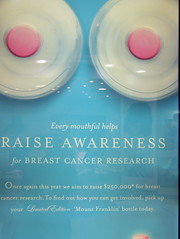 Quite a few people have asked me my take on OCLC’s new policy about record-sharing. I’ve been quiet on this for three reasons: I’m insanely busy, I am still digesting my thoughts, and I have been concerned that whatever I say may reflect back on MPOW (My Place Of Work) — though no one at MPOW has so much as whispered this suggestion.
Quite a few people have asked me my take on OCLC’s new policy about record-sharing. I’ve been quiet on this for three reasons: I’m insanely busy, I am still digesting my thoughts, and I have been concerned that whatever I say may reflect back on MPOW (My Place Of Work) — though no one at MPOW has so much as whispered this suggestion.
For those trying to get up to speed on viewpoints for this issue, American Libraries has a good news article that links to key resources. However, my favorite analysis is actually an elegantly-written article on RDA by Diane Hillmann that in passim has excellent commentary on OCLC’s policy.
This is as good a time as any to announce that I’m struggling to pull together a podcast series (time at the moment being the great muncher of all future-subjunctive projects) and one of the first topics is this policy — to let key voices speak for themselves. (OCLC has been invited.) These podcasts are planned to be short and thought-provoking… and I’m trying to script them in advance, get a little music, and so forth.
All that said…
Caveats in mind, these are my thoughts… and these are strictly my thoughts; MPOW is too busy with migrations and development to sit around worrying about the Big O.
OCLC has made a policy clarification that in the short run is a perfectly reasonable claim intended to protect the interests of its members and the body of data accumulated under its aegis. In this intellectual-property model, you are a yogurt-maker. I am your distributor. I charge you for this service, and if someone else tries to take your yogurt from my warehouses or steal it from the trucks that deliver your yogurt to stores, I set my dogs after them.
In a capitalist society, as long as we’re talking about yogurt, this model could continue ad infinitum (unless yogurt production were nationalized). However, on the web, many cost models have morphed from data ownership to data service.
I have long maintained that OCLC doesn’t quite understand the business it is in. They think they are selling yogurt, when they are providing a (hopefully valued) service.
The very fact that OCLC is making this claim — when as far as I know, there has been no member groundswell begging them to do so — points to how aware they are that the spectre of endless legal hassle is the only levee shored up against a massive and disruptive sea-change to how LibraryLand shares and manages bibliographic data (assuming the Big O to be the de facto mass-catalog-of-record).
In that sense, OCLC is a police officer running onto the train tracks, waving his arms and shouting, “Train, stop!”
In the short term, OCLC can enforce business as usual. Most members in the trenches aren’t up in arms, probably because no one has built a compelling narrative explaining why they should care (at least to the point of taking action), and many have built business practices around OCLC’s services that largely serve them well, and at the moment, they do not have the time or need to reexamine these practices.
Yet many people who participate in record “sharing” with OCLC have an ambivalent relationship with the Big O, and (OCLC’s claims notwithstanding) this policy reinforces their suspicions that OCLC is often acting more in its own, quasi-corporate interests than on behalf of its members. In that sense, OCLC may have staved off minor inroads from inconsequential “commercial” interests (those evil vendors, trying to ply us with tools such as LibraryThing) at the price of undermining their persona as a benevolent data czar.
OCLC now has a brief window of opportunity to rethink its cost model, but — ironically, for an organization known for its excellent reports and symposia exhorting our profession to embrace change — rather than developing new revenue models that could protect both OCLC and the many libraries it serves — it is using this time trying to prevent the future. OCLC, of all organizations, should know that the leadership truism, “lead, follow, or get the hell out of the way,” does not accommodate a fourth option of running in place.
Furthermore, the brief 11-day comment period, held during a time in which the whole world’s attention was trained on the economic meltdown and the U.S. presidential campaign, suggests that OCLC didn’t think it needed more member input than it already had.
I really don’t believe OCLC was avoiding member input. The backpedaling and rapid explanations from OCLC suggest they were caught by surprise. Instead, I suspect that within the concrete mountain of OCLC decision-making, they — an organization born in a library and designed by library leaders — thought they knew what members wanted and were taking prudent steps on their behalf — a historical decision that in a decade or so may in retrospect seem almost poignant.
(Thanks to Flickr user scheng_fui for licensing the photo for re-use.)












